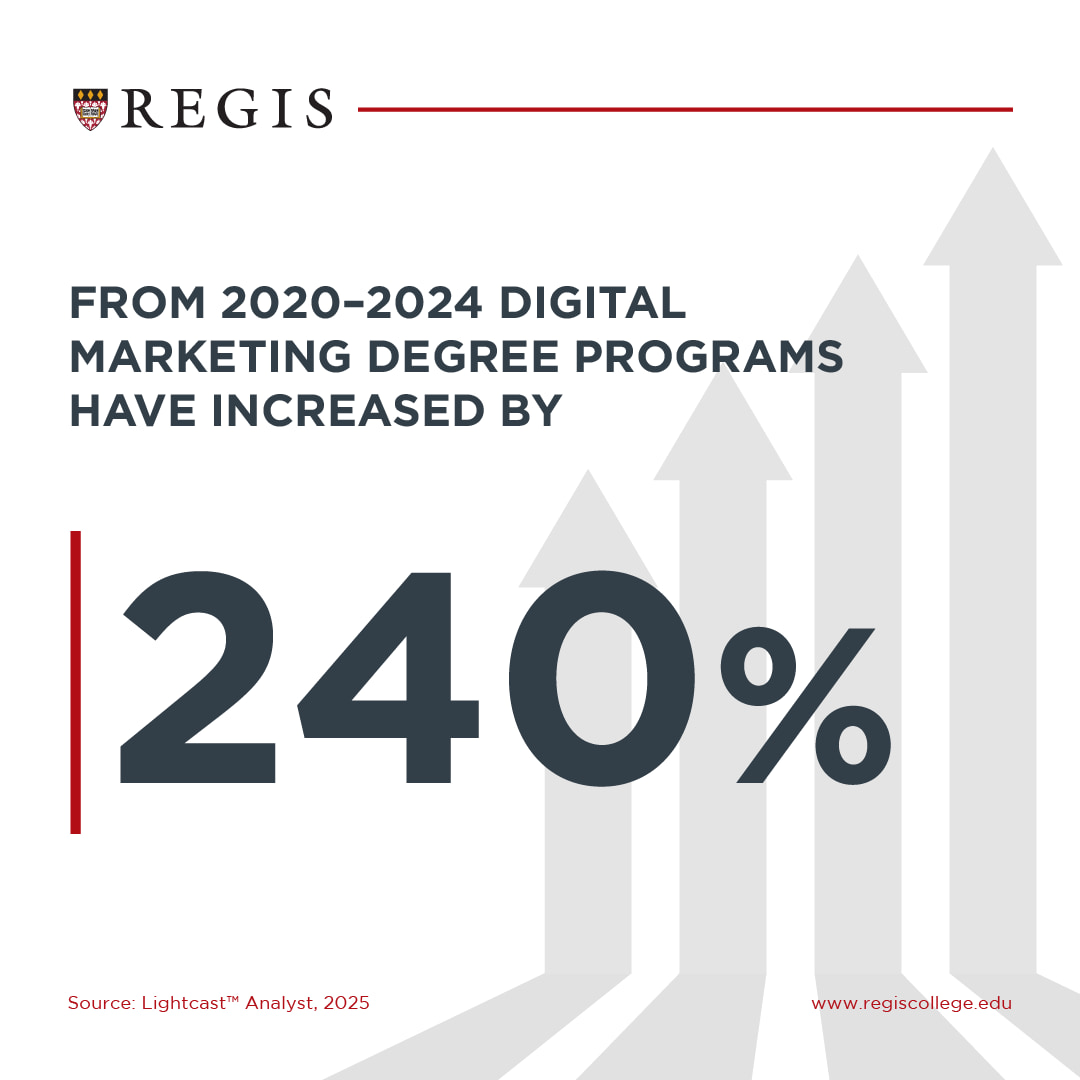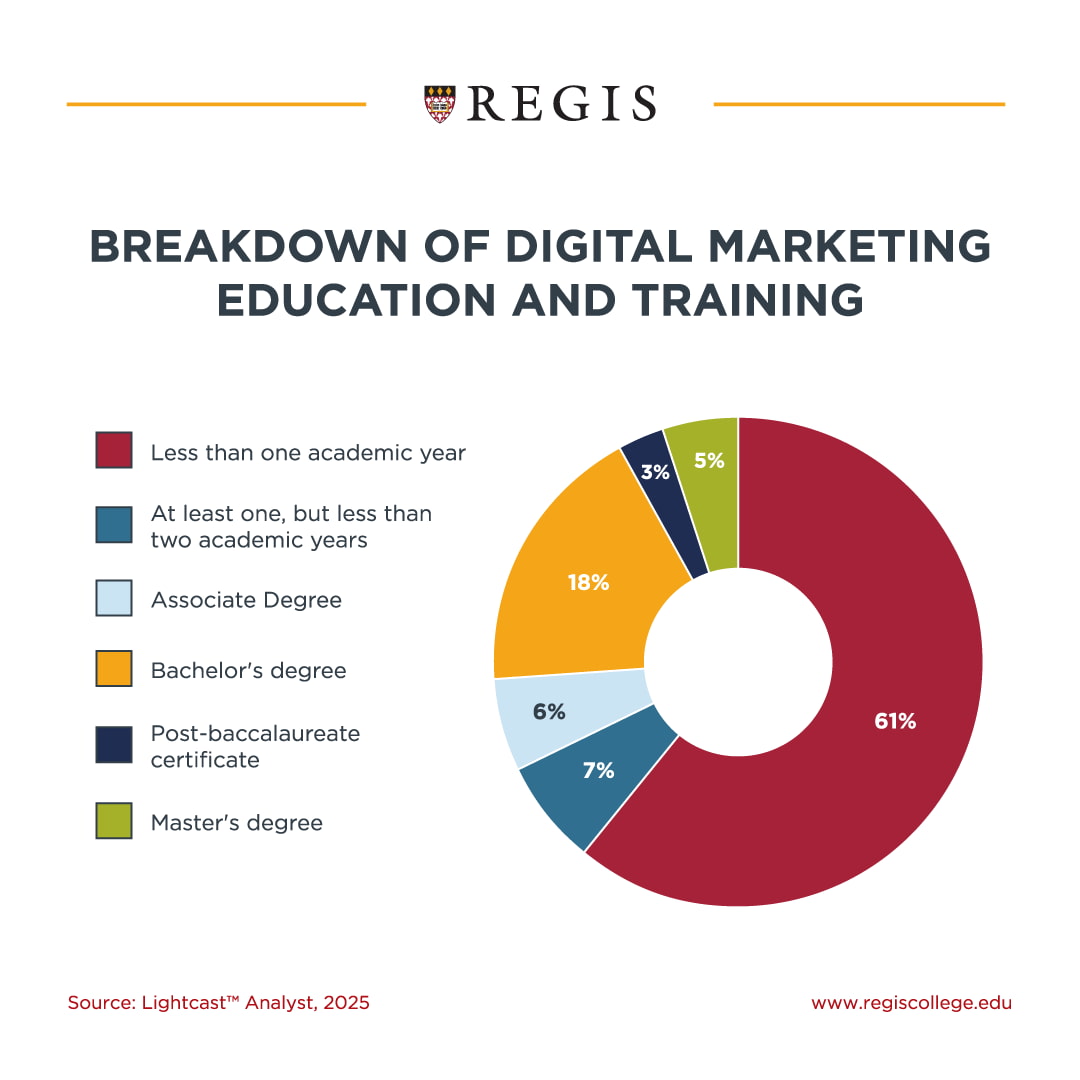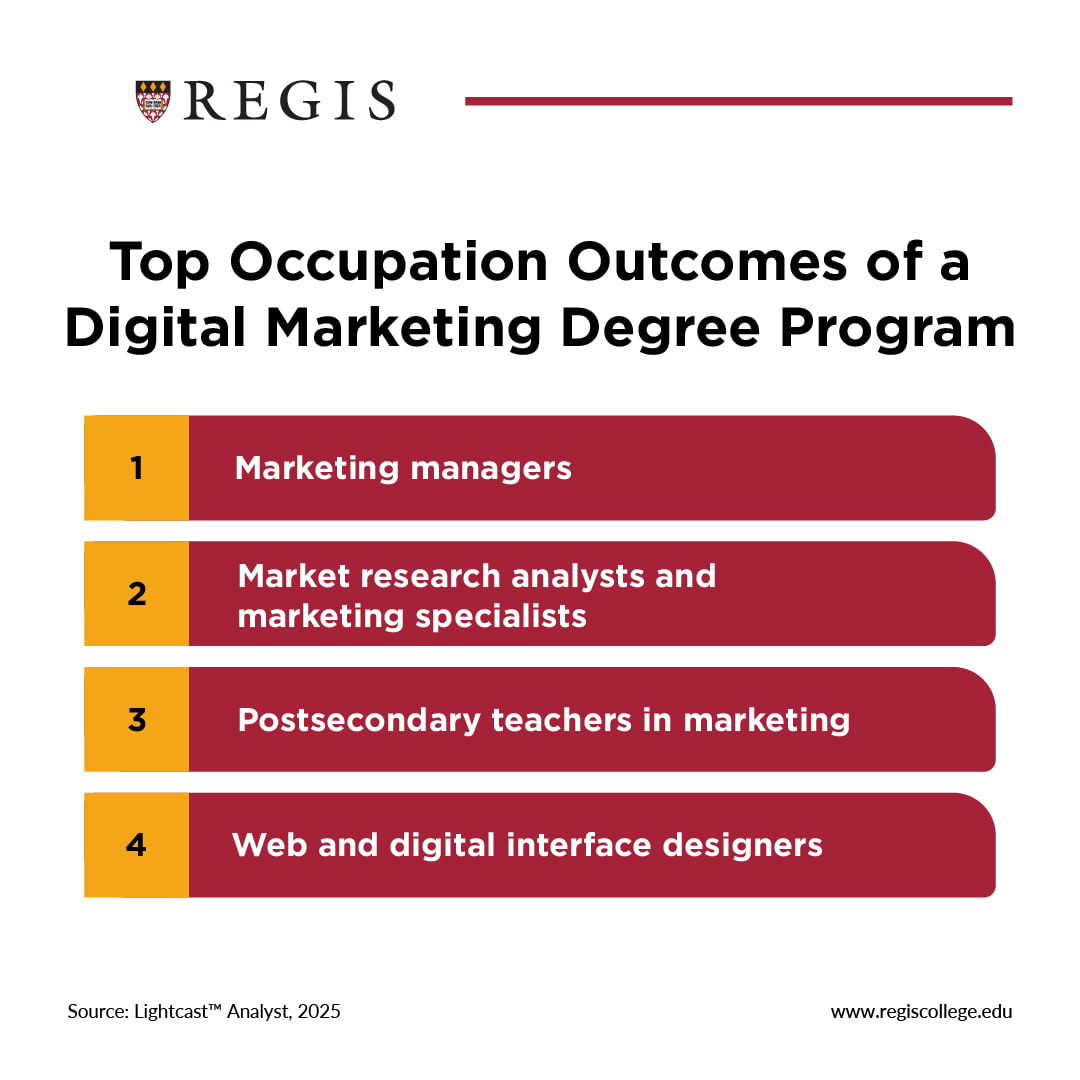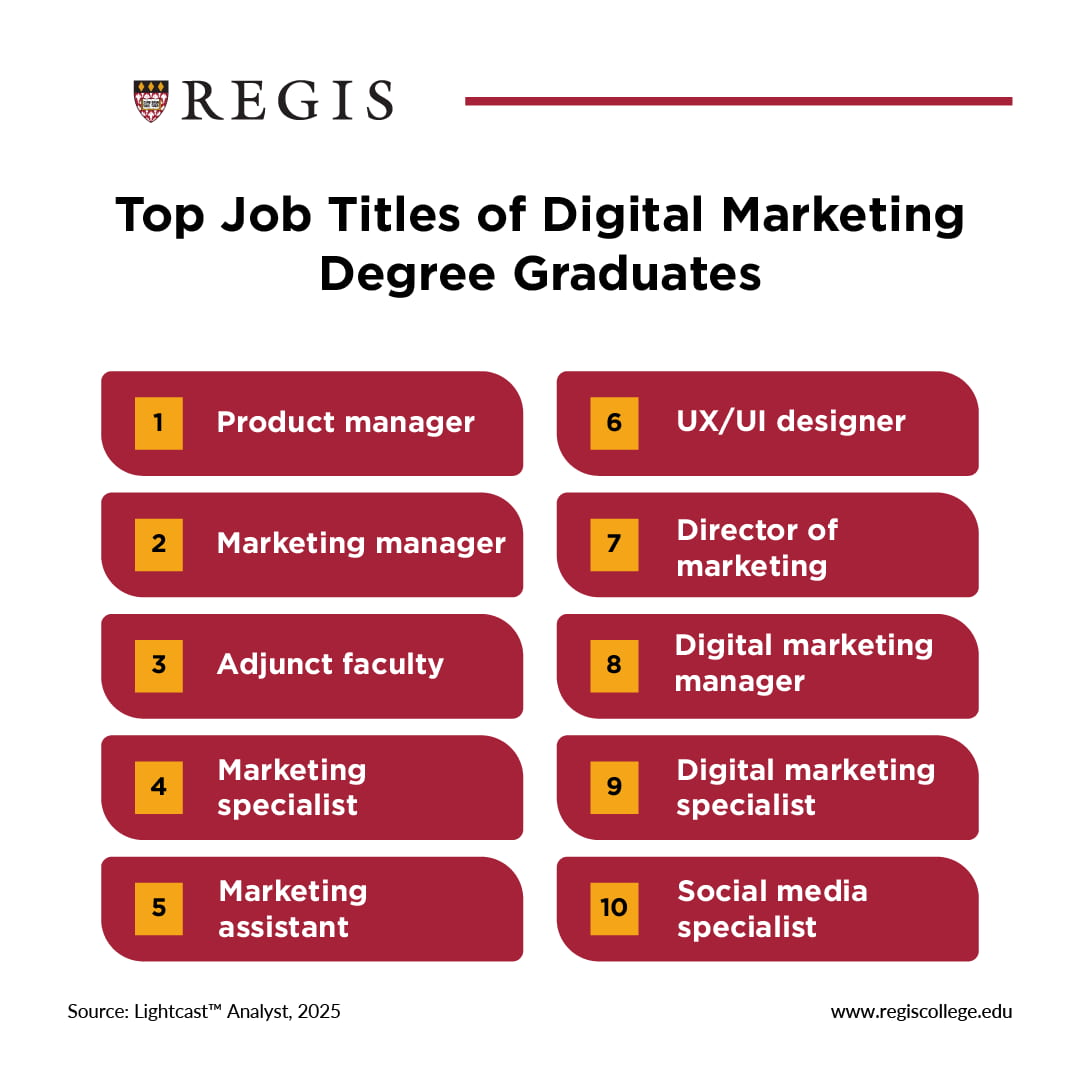Digital marketing is an exciting and fast-moving field, but knowing how to grow your career within it isn’t always straightforward. “There are so many training options available,” says William Koehler, the Dean of the School of Business and Communication at Regis College. “You can take a two-hour crash course, enroll in an online certificate program, or commit to a full degree. But sometimes all these options can make the right choice even more confusing.”
And that demand for training has only increased as the industry evolves. According to educational program market data, digital marketing training programs have grown 240 percent from 2020 to 2024.

With so many paths available, it’s important to choose one that not only builds your expertise but also aligns with your long-term goals. The right training can give you the strategic knowledge and practical skills needed to stay competitive in a field that’s constantly evolving.
This guide explores the best digital marketing training options and how to choose the right fit for your future.
Key Takeaways
- Digital marketing training options vary widely, from short courses and bootcamps to full degree programs. Choosing the right path depends on your experience level, career goals, and learning preferences.
- Short courses and bootcamps can help professionals fill skill gaps, but they often lack the strategic depth, industry mentorship, and hands-on learning needed for career advancement into specialized or leadership roles.
- A master’s degree in digital marketing provides a more structured and comprehensive education, helping professionals develop expertise in high-demand areas like digital strategy and leadership and attain a credential that employers value.
- Hands-on learning opportunities, such as internships and live client projects, are critical for applying digital marketing skills in real-world settings. Strong programs incorporate practical experience to help students transition into advanced marketing roles.
What Are Your Training Options in Digital Marketing?
1. Self-Paced Online Courses
For those looking for a quick, flexible way to explore digital marketing, self-paced online courses offer a low-cost introduction. Platforms like Google Digital Garage, HubSpot Academy, and Meta Blueprint provide free or inexpensive courses covering search engine optimization, content marketing, and paid advertising. Since these courses are available on demand, they’re convenient for busy professionals and independent learners.
However, while self-paced courses build foundational knowledge, they fall short in key areas critical for career growth. These programs lack structured, hands-on learning, making it difficult to apply skills in real-world projects. Without practical experience, mentorship, or career guidance, learners may struggle to demonstrate expertise to employers or translate their knowledge into career advancement.
Because of the accessibility of short courses, many digital marketing professionals have entered the field with minimal formal education. According to degree program market data, in 2024 61 percent of digital marketing professionals reported completing less than one academic year of training, such as an online short course, while only five percent had earned a master’s degree.

But as the industry evolves, those numbers are expected to shift. “As digital marketing degree programs become more prevalent, we’re going to see more professionals pursue formal education,” Koehler says. “Right now, many entry-level marketers can get by with just a short course; but as AI and automation reduce the need for execution-based roles, companies will look for professionals with more strategic expertise—something that comes with higher education.”
While self-paced courses remain a useful starting point, they rarely provide the depth of expertise or the credentials needed for long-term career growth. Without formal education beyond a few months of training, professionals may find it difficult to move beyond execution-level roles into strategy, leadership, and management positions.
2. Bootcamps and Certifications
For professionals eager to build digital marketing skills quickly, bootcamps and certification programs offer an intensive and structured way to learn. Programs like General Assembly, BrainStation, and Coursera Certificates focus on in-demand areas such as search engine optimization, paid advertising, and analytics, making them appealing to those looking to upskill or shift into a marketing role.
Unlike self-paced courses, bootcamps provide live instruction, interactive assignments, and structured coursework, often within a few weeks or months. This format allows students to engage with instructors, work through real-time exercises, and gain exposure to industry tools.
However, while bootcamps can accelerate learning, they come with limitations that can impact long-term career growth, such as:
- Covers technical skills, but lacks broader marketing strategy and audience insights
- Requires a significant financial investment, but does not provide an accredited degree
- Teaches concepts through exercises, but does not offer hands-on experiences
For those looking to gain a quick skill or add a certification to their resumé, bootcamps can be a useful tool but not a gateway into the industry.
3. Digital Marketing Degree Programs
While many digital marketers enter the field through short courses, advancing beyond execution-level roles often requires a deeper understanding of strategy, analytics, and leadership. “In a competitive job market, having a more substantial credential that speaks to your knowledge, skill set, and dedication makes a difference,” Koehler says.
There are a few educational options available to prospective digital marketers. For example, a bachelor’s degree is a great entry point for those new to the field, but if you’ve already completed an undergraduate degree, a master’s degree can help refine your expertise and prepare you to take on greater leadership responsibilities.
According to job market data, the top occupational outcomes of professionals with a master’s-level degree in digital marketing include:
- Marketing managers
- Market research analysts and marketing specialists
- Postsecondary teachers in marketing
- Web and digital interface designers

In addition, one of the biggest advantages of a master’s degree is the opportunity for real-world application. While short-term certifications often rely on theoretical coursework, master’s programs incorporate case studies, live projects, and data-driven decision-making exercises to bridge the gap between learning and execution.
How to Choose the Right Training for Your Career Goals
Digital marketing offers a wide range of career paths, but not all training programs provide the same level of depth, structure, or long-term value. The right choice depends on your experience, professional aspirations, and how you learn best. This section will help you evaluate your options and determine which type of training aligns with your career trajectory.
1. Consider Your Career Goals
The first step in choosing the right digital marketing training is to consider how your education aligns with your long-term career goals. While gaining technical expertise is valuable, moving into specialized roles often requires a deeper understanding of strategy, business impact, and industry trends.
Many professionals enter the field with a focus on execution—managing social media accounts, optimizing paid ads, or writing content—but advancing into higher-level positions requires the ability to integrate these tactics into a broader marketing strategy. According to job postings data, some of the most common career outcomes for professionals with formal training in digital marketing include:
- Product manager
- Marketing manager
- Adjunct faculty
- Marketing specialist
- Marketing assistant
- UX/UI designer
- Director of marketing
- Digital marketing manager
- Digital marketing specialist
- Social media specialist

Professionals hoping to break into these roles often need more than technical skills. So whether you’re looking to refine your expertise, shift into a new role, or position yourself for leadership opportunities, ensuring your training provides a well-rounded education in both execution and strategy is key to long-term career success.
2. Assess Your Current Skills
When choosing a digital marketing training program, it’s important to understand your current skill level. Whether you're just getting started or looking to refine your expertise, identifying gaps in your knowledge can help you determine the best learning path.
As digital marketing evolves, businesses are looking for professionals with a mix of strategic thinking and technical execution. Some of the most in-demand skills today include:
- Search engine optimization
- Content strategy
- Paid media
- Data analytics
- Social media strategy
- Email marketing
Short courses can introduce these concepts, but they often lack depth, hands-on learning, and career support. Degree programs, such as a bachelor’s or master’s degree in digital marketing, provide structured learning, industry mentorship, and real-world application, which are key components for professionals to build expertise, specialize, or advance into leadership roles.
3. Look for Hands-On Learning Opportunities
Digital marketing is a highly applied field, and the best training programs go beyond theory to provide real-world experience. Gaining practical skills not only reinforces what you learn but also helps build a portfolio that sets you apart in a competitive job market.
Strong programs integrate practical application in a variety of ways, including:
- Live client projects
- Case studies and campaign simulations
- Industry mentorship and networking opportunities
Internships are another critical component of hands-on learning, particularly for early-career professionals. “Internship experience is especially important for those who are younger in the field,” Koehler says. “It allows them to apply their skills in real-world settings and demonstrate their expertise to employers.”
If you’re already working in marketing, internship-in-place opportunities allow you to complete required internship work at their current company. This option can help you gain additional credentials, apply new strategies, and position yourself for leadership roles—all without stepping away from your job.
“We work with students to design a project within the scope of their employment,” Koehler adds. “It gives them the opportunity to apply new skills, gain practical experience, and demonstrate their value to their employer—without pausing their career.” This structure is particularly valuable for professionals who are looking to advance but need more formalized experience and credentials to break into leadership roles.
Find the Right Digital Marketing Training for You
Choosing the right training program can be a game-changer in your digital marketing career. Developing in-demand skills, gaining real-world experience, and staying ahead of industry trends are key to standing out in a competitive job market. Investing in structured, hands-on education can provide the expertise needed to advance into specialized or leadership roles.
Regis’ Master’s in Digital Marketing Communication program is designed for both early-career professionals and experienced marketers looking to keep up with digital trends. With a focus on practical application, strategic decision-making, and career advancement, Regis provides the tools and mentorship to help professionals expand their expertise, refine their strategy, and transition into high-impact roles.
For those already working in marketing, Regis also offers flexible learning opportunities to help professionals sharpen their digital marketing skills and stay ahead of industry changes without stepping away from their careers.
Now is the time to take the next step. Explore Regis College’s digital marketing program and gain the skills, experience, and industry insight needed to thrive in this ever-evolving field.




